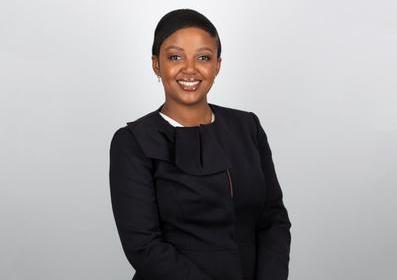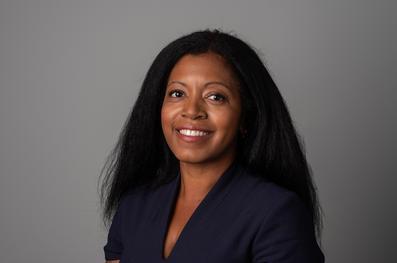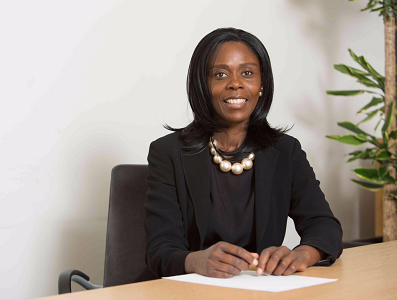Inspired by the recent event for Black History Month 2023 organised by the Inns of Court Alliance for Women, the Bar Council’s Equality and Diversity Policy Analyst Mariam Diaby caught up with the event panellists Natasha Shotunde, Elaine Banton and Barbara Mills KC to ask some questions about being Black women barristers and the challenges we face when trying to achieve a fairer future at the Bar.
Mariam Diaby: Why is it important to mark Black History Month?
Natasha Shotunde: “I think Black History Month is an opportunity for everybody, not just us, as in Black people, to learn more about the richness of the cultures of Black people that we have in this country. I think it's an opportunity for us to celebrate and to reflect on how far we've come and how far we need to go and also an opportunity for everybody else in the country to reflect on the same and what they can do to hopefully advance Black people in our country.
“I think it's important to mark Black History Month because Black history is not taught in schools in this country. The only history that's really taught is about the civil rights movement. I think also when we do talk about slavery, we talk about it from the perspective of when it's happening in America. As if it's an American problem, as if it was not the British that did this.”
Mariam Diaby: Why is diversity, equality and inclusion important for the Bar and society?
Natasha Shotunde: “People usually say that it is important for the Bar because it is important for the justice system to reflect and represent the society it serves but I would also say that it just the right thing to do.
"Not allowing people to enter or advance into any profession because of the colour of their skin is just wholly wrong. I think discrimination is wrong and we need to root it out.
“Regardless, there is a benefit in having diversity for clients. We also deal with diverse clients. Looking at the amount of family cases I have dealt with, every single one I have dealt with involved Black people, with regard to children, parents, in care proceedings. There was one case that I had where all counsel were Black, as well as the social workers. It is making sure that there is a good cultural match.
“Black barristers in particular will be able to pick up and raise issues that others may not have considered. We also obviously need diversity in, for example, our criminal justice system because the rates of conviction and the sentences that we’re receiving as Black people are far higher than other demographics.
"It is important to make sure that miscarriages of justice don’t happen. This may be easier to spot by a Black barrister who has lived experience.”
Mariam Diaby: Why are alliances at the Bar important?
Barbara Mills KC: “An ally is someone who sets an intention to consistently promote an atmosphere of inclusion, a culture where they understand that this space works best if everybody is included. An ally is somebody who understands that they are privileged, and they use that privilege, in a consistent and sustained way to support and advocate for others. I have privilege by virtue of being a Silk and a Deputy High Court Judge. I recognise my position gives me certain privilege, so I use that and feel that part of my role is to hold out my hand to anybody and everybody who would like a hand up.
“Allyship is about being curious about the issues and curious enough to make your own inquiries. When invited to a law firm for Black History Month the firm outlined in advance what they were already doing in their space – this is an example of someone who understands what an ally is and they understand that the burden falls on them to educate themselves.”
Mariam Diaby: How does discrimination shape entry, retention and progress at the Bar? What are the challenges?
Elaine Banton: "While access is improving there are still key challenges in terms of retention and progression to higher appointments generally such as Silk and the senior judiciary. Social mobility remains a significant area for increasing access and it is multifaceted with many intersectional aspects including race, disability and so on.
"A key challenge for the Bar is to be truly reflective of all of the talent within the society it serves. We all have our own experiences which shape our unique perspectives. Seeing this reflected at the Bar, serves the rule of law and strengthens agency in the system."
Mariam Diaby: What is the Bar Council’s role in achieving diversity, equality and inclusion at the Bar?
Barbara Mills KC: “The Bar Council represents 18,000 barristers who are specialist independent advocates. The Bar attracts talent now from across a diverse pool of people, and those advocates make a crucial contribution to the justice system. It is also the place from which a significant proportion of judges are drawn, and we all know that judges have independence. They maintain the rule of law and so on. And so, as the representative body of all barristers, the Bar Council's role is front and centre in not just promoting and advocating, but also ensuring that the figures are understood, the struggles are understood, and the solutions are provided.
“I'm very proud of what the Race Working Group Report has achieved; setting out recommendations, so not preaching to anybody but just sort of saying to people to look into your space and look at where are the gaps. It may not be access. Forget access. It might be that you've already got Black people in your space, but they're not staying. Or if they stay, the quality of their work means that they can't progress to be leaders as defined by the profession by which I mean taking Silk and becoming judges, and then we also don't stop there, we produce action plans, race awareness training, guides for positive action, all sorts of things have been produced, and that for me is the Bar Council's role, to highlight the issues, provide solutions and then also provide mechanisms and guidelines to assist people to get it right. We still have a long way to go, but I am proud of what the Race Working Group has done in being at the forefront."
Mariam Diaby: What can each of us do to help secure positive change at the Bar?
Natasha Shotunde: “I think the way you're going to really create change is for individuals to do the internal work, to find out where or how in their lives they have preconceptions of people, they stereotype people or may have acted in a way that is discriminatory and challenge that within themselves and change within themselves.
"The problem that we have with this work is that it requires looking at yourself critically and a lot of people don't want to do that.
“This internal work needs to happen, it is going to assist in how they view us when they interview us for positions like Silk and judicial appointments. It is also going to help in terms of access and in respect of the people coming in. It is going to help in respect of how we’re dealt with in court, how we’re dealt with by our clients, how we’re dealt with by professional clients (solicitors).
“This is the sort of stuff that is really difficult to mandate and I understand of course we have the race training and it is almost all we can do when trying to change people’s minds and perceptions but there is still going to be a lot of resistance to it. So, I think looking at the training and considering tweaking it, reviewing and evaluating it where possible. We also need to have the mechanisms and the ability for people to be able to make complaints, that it is transparent, that protects the people who have delivered training.
“I'm personally concerned about how different Chambers deal with complaints because if it's the Chambers that's dealing with the complaint that you made against another barrister in the Chambers, for example, then how do you determine that the process is going to be fair? When the people who are going to be adjudicating the compliant also know both parties involved. It is difficult and you may not want to complain. I think Chambers need a zero-tolerance policy. If I'm complaining about a microaggression, they'll minimise it and just be like, oh, the person should apologise. I think, you know, we need tougher sanctions.
“Allocation of work in Chambers needs monitoring and the reports of those findings need to be disclosed. They need to be disclosed to everybody else in Chambers. They need to be disclosed to the Bar Standards Board and the Bar Standards Board needs to put in a mandate where you have to provide it every two years or every three years or every one year to the Bar. Even if they don't look at it, at least it encourages Chambers to actually undertake that work, because I'm not sure how many undertake that work. There also needs to be more transparency in the clerking system.
“I also want the Bar to work together with legal firms, too, because I'm concerned that solicitors and/or clients are deciding against instructing Black barristers in particular because they are Black. I think there needs to be some joint work between the Bar Council and the Law Society. And also the Bar Standards Board and the Solicitors Regulatory Authority. I think everybody needs to sit at the table and I think they need people like myself and others at the table, invite people to explain their experiences and what our concerns are and it's long overdue.
Elaine Banton: “We can each play a role by lifting as we climb. Being a mentor and an ally to others, making the Bar a truly more inclusive place. I see allyship as key. We should intervene and assist when we see a colleague getting bullied for example.
“Bullying and harassment in all forms is insidious and directly affects retention and progression. The statistics show that Black female barristers are the practitioners most likely to be bullied at the Bar, as well as being the least paid and least likely to progress. Be an ally not a bystander. Allocation of work, including types of work, requires regular monitoring.
“Regardless, we have earned our seat at the table. We are here and doing excellent work; still, we rise.”
Mariam Diaby: Can you tell us about a Black woman lawyer who has inspired you?
Barbara Mills KC: “Stella Thomas who was the first Black African who was called to the Bar. An extraordinary woman, came to Oxford, got her degree, qualified as a barrister, and went back to Africa and she was the first woman magistrate in West Africa. She did a lot of things for racial equality and the civil rights movement. She inspires me because when I think of the difficulties that we face in 2023, I cannot imagine what it was like to be called to the Bar in 1933.
“Dame Linda Dobbs. Obviously, you know, she was the first Black High Court judge. The only black High Court judge. She took Silk in 1998 and became a full-time High Court judge in 2004 and retired in 2013. When she became a judge, she said that she was hoping that she would get the ball rolling and change the lack of diversity. Unfortunately it took another seven years for a brown skin High Court judge. But we're still waiting for a full-time Black High Court judge in any of the divisions across the board.
“Also Pat Scotland. She's now the Secretary General of the Commonwealth of Nations. She's been a barrister, a politician and she's now a diplomat.
“I'm inspired by every single Black woman at the Bar who, despite the stats, despite the obstacles, has something inside of them that just makes them believe that this is a place for them and that they will keep going.”
Mariam Diaby: How have things changed at the Bar since you entered the profession?
Elaine Banton: "Some things have changed quite dramatically, such as the numbers of women entering the profession and it is becoming more inclusive generally. We now have more role models for diversity.
"I recently spoke at a panel event at Middle Temple with five Black female barristers - Barbara Mills KC, Nneka Akudolu KC, Abimbola Johnson, Natasha Shotunde, and myself. This event could not have occurred when I was starting out at the beginning of my career, so this is important. This means we have built a strong network of inspiring and supportive Black women at all levels, and this is powerful.
"If you can see me; you can be me.”
About the barristers:

Natasha Shotunde
Natasha Shotunde is an award-winning barrister and Honorary Doctor of Laws practising from Garden Court Chambers. She is the Co-Founder and Chair of the award-winning Black Barristers’ Network, an elected member of the Bar Council, a member of the EDI Committee at the Honourable Society of Lincoln’s Inn and an Associate Lecturer at Goldsmiths, teaching Media Law and Ethics. She was formally the Chair of the Board of Trustees at AVA, a leading charity committed to ending violence against women and girls. Natasha is passionate about eradicating violence against women and girls and tackling race and gender discrimination within the profession and society generally. Her work has been recognised through multiple awards, including an Honorary Doctorate in Law from Anglia Ruskin University in 2022, the Rising Star award at the UK Diversity Legal Awards 2021 and the Highly Commended: Future Leader – Diversity and Inclusion award at the Chambers Bar Awards 2020.

Elaine Banton
Elaine Banton is an experienced employment, equality, discrimination and human rights barrister at 7BR Chambers, focusing on complex and protracted litigation at all levels. Often appearing in high profile matters her practice includes disciplinary, regulatory, sports law and stress at work. Elaine was featured as the Times Lawyer of the Week in March 2023 as a result of the pre dismissal remedy judgment of £300k in the long-running litigation involving a retrial of sex discrimination, harassment and maternity claims in Rajput v Commerzbank AG. Elaine recently gave evidence in Parliament to the Joint Committee on Human Rights in the Inquiry into Human Rights at Work, debated the cab rank rule when speaking in Amsterdam at the Fédération des Barreaux d’Europe, and attended the CSW 67 as a delegate for UN Women UK. She is Co-Chair of the Bar Council’s Equality, Diversity and Social Mobility Committee and a Bencher at Middle Temple.

Barbara Mills KC
Barbara Mills KC has been elected as the Vice Chair of the Bar Council for 2024, becoming the first specialist family practitioner in 35 years to take up the role and the first Black person and first person of colour to assume the office. Barbara was called to the Bar by Inner Temple in 1990 and took silk in 2020. She is an arbitrator and a mediator, a Fellow of the International Academy of Family Lawyers, and co-editor of the International Family Law Journal. She specialises in difficult and complex children cases often with an international element. Barbara is joint head of chambers at 4PB – one of the leading family law sets in England and Wales. She sits as a Deputy High Court Judge and has been a Recorder on the South Eastern Circuit for over ten years. Barbara is a member of the Bar Council’s Equality, Diversity and Social Mobility (EDSM) Committee and co-chairs the Bar Council’s Race Working Group, which published the landmark Race at the Bar report in 2020. As a Governing Bencher at Inner Temple, Barbara is also a member of the Inn’s EDSM and international committees.